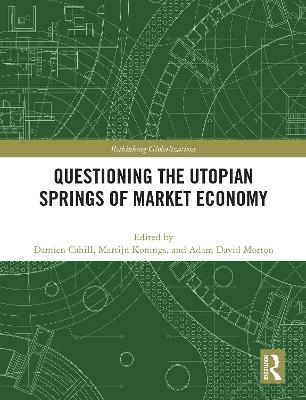
Questioning the Utopian Springs of Market Economy
Routledge (Verlag)
978-0-367-54627-4 (ISBN)
For Polanyi, in The Great Transformation, the utopian springs of the dogma of liberalism existed within the extension of the market mechanism to the ‘fictitious commodities’ of land, labour, and money. There was nothing natural about laissez-faire. The progress of the utopia of a self-regulating market was backed by the state and checked by a double movement, which attempted to subordinate the laws of the market to the substance of human society through principles of self-protection, legislative intervention, and regulation. For Hayek, in The Road to Serfdom, the utopia of freedom was threatened by the abandonment of individualism and classical liberalism. The tyranny of government interventionism led to the loss of freedom, the creation of an oppressive society, and the despotism of dictatorship that led to the serfdom of the individual. Economic planning in the form of socialism and fascism had commonalities that stifled individual freedom. Against the power of the state, the guiding principle of the policy of freedom for the individual was advocated. Taking these different aspects of market economy as its point of departure, this book promises to deliver a set of essays by leading commentators on twenty- first- century political economy debates relevant to the present conjuncture of neoliberalism.
The chapters in this book were originally published in a special issue of the journal Globalizations.
Damien Cahill is Associate Professor of Political Economy at the University of Sydney, Australia. His publications include Neoliberalism (with Martijn Konings, 2017) and The End of Laissez- Faire? On the Durability of Embedded Neoliberalism (2014). Martijn Konings is Professor of Political Economy and Social Theory at the University of Sydney, Australia. His publications include The Development of American Finance (2011), The Emotional Logic of Capitalism (2015), Neoliberalism (with Damien Cahill, 2017), and Capital and Time: For a New Critique of Neoliberal Reason (2018). Adam David Morton is Professor of Political Economy at the University of Sydney, Australia. He is the author of Unravelling Gramsci: Hegemony and Passive Revolution in the Global Political Economy (2007), Revolution and State in Modern Mexico: The Political Economy of Uneven Development (2011), which was the recipient of the 2012 Book Prize of the British International Studies Association (BISA) International Political Economy Group (IPEG), and Global Capitalism, Global War, Global Crisis (with Andreas Bieler, 2018).
Introduction: Questioning the utopian springs of market economy
Damien Cahill, Martijn Konings and Adam David Morton
1. Polanyi vs Hayek?
Philip Mirowski
2. Polanyi’s two transformations revisited: a ‘bottom up’ perspective
Sandra Halperin
3. ‘Our world was made by nature’: constructions of spontaneous order
Gareth Dale
4. Market/society: mapping conceptions of power, ideology and subjectivity in Polanyi Hayek, Foucault, Lukács
Nicola Short
5. The great trasformismo: Antonio Gramsci and Karl Polanyi on the rise of Fascism
Adam David Morton
6. Polanyi, Hayek and embedded neoliberalism
Damien Cahill
7. Karl Polanyi as a spatial theorist
Philip Roberts
8. Against exceptionalism: the legitimacy of the neoliberal age
Martijn Konings
9. Neoliberalism as a real utopia? Karl Polanyi and the theoretical practice of F.A. Hayek
João Rodrigues
10. Hayek and the Methodenstreit at the LSE
Jeremy Shearmur
11. Reading Polanyi in Erbil: understanding socio-political factors in the development of Iraqi Kurdistan
Robert Smith
| Erscheinungsdatum | 21.04.2022 |
|---|---|
| Reihe/Serie | Rethinking Globalizations |
| Verlagsort | London |
| Sprache | englisch |
| Maße | 189 x 246 mm |
| Gewicht | 362 g |
| Themenwelt | Geisteswissenschaften ► Philosophie |
| Sozialwissenschaften ► Politik / Verwaltung ► Politische Theorie | |
| Wirtschaft ► Volkswirtschaftslehre ► Wirtschaftspolitik | |
| ISBN-10 | 0-367-54627-2 / 0367546272 |
| ISBN-13 | 978-0-367-54627-4 / 9780367546274 |
| Zustand | Neuware |
| Haben Sie eine Frage zum Produkt? |
aus dem Bereich


